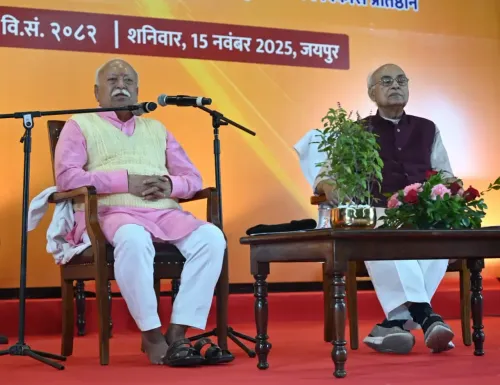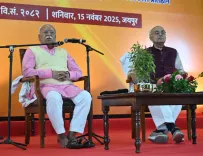Madhya Pradesh Engages with the 16th Finance Commission

Synopsis
Key Takeaways
- High-profile delegation led by Arvind Panagariya visiting MP.
- Assessment of public investments over the past decade.
- Focus on tax devolution and resource allocation.
- Meetings with local officials and stakeholders.
- Future financial plans for Madhya Pradesh.
Bhopal, March 3 (NationPress) Madhya Pradesh is preparing for a significant event as a distinguished team, led by Arvind Panagariya, Chairman of the 16th Finance Commission, is set to visit the state starting Tuesday.
This visit will act as a critical assessment of the public investments made over the last decade, examining whether the financial resources allocated to the state have effectively enhanced human development indices.
The State Urban Development Minister, Kailash Vijayvargiya, stated in Bhopal on Tuesday, "The members of the 16th Finance Commission are here and will consult with various officials and stakeholders in the state."
This visit comes in the wake of the 15th Finance Commission, which had previously noted a "marginal improvement in human indices" in the state, while affirming the "accuracy" of investment statistics.
The delegation's main agenda is to discuss vital topics such as tax devolution between the Center and states, the calculation of grants-in-aid, and the fair distribution of resources. The recommendations provided by the commission will span a five-year timeframe, from April 1, 2026, to March 31, 2031.
To provide background, the 15th Finance Commission, chaired by NK Singh, had advised that state health expenditure should be raised to over 8 percent of their budget by 2022.
Moreover, the 14th Finance Commission had suggested a devolution of Rs 12,200.72 crore to Madhya Pradesh as Basic Grant (6.77 percent of total grants) and Rs 1,355.64 crore as Performance Grant (6.77 percent of total grants) for the period from 2015 to 2020.
The 15th Commission's report also highlighted that, considering macroeconomic trends such as growth, inflation targeting, and GST implementation, the state should target a fiscal deficit of 2.5 percent during 2020-25, while keeping the debt-GSDP ratio around 23.8 percent.
During their visit, the commission will conduct meetings with representatives from political parties, local entities, panchayats, urban bodies, and administrative officials. Dialogues will center on the effects of the enhanced tax devolution rate on the state's financial status and alterations in spending patterns.
Furthermore, the commission will explore various regions of Madhya Pradesh to directly evaluate the outcomes of financial schemes, development initiatives, and policies.
They will assess the advancement of numerous development projects with departmental officials and gather recommendations for future enhancements.
The discussions will aid in defining the state's upcoming financial resources, propelling its overall growth.









